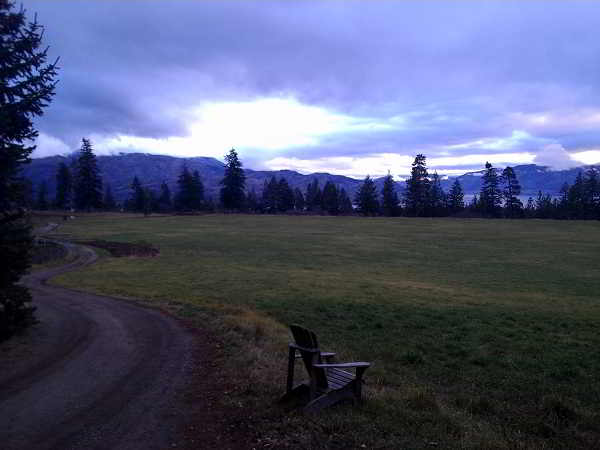My partner Vanessa and I (and that’s partner in both the professional sense and the hubba-hubba one) do not own the land we’re farming. We’re on a lease at The Homestead, an organic farm in Peachland that has been under the care of Joe and Jess Klein for nearly 30 years.
That we would start out our farming careers on leased land was inevitable. Much of BC’s best farmland is also coveted real estate. And so, land prices being what they are (Keith Richards high), and returns on farming being what they are (Barry White low), the die is cast for us for the foreseeable future.
Such is the case for the majority of aspiring farmers I’ve met in the last few years. That’s how long I’ve been farming–about five. Which is long enough to observe the differences between ownership and leasing, and to judge whether they are significant.
I believe they are, and for that reason I think that two of the three little pigs in the fairy tale are terribly misunderstood. The way you probably interpret the story is that the first two pigs were layabouts, no doubt terribly spoiled as piglets, whose goal was to build a house with the least possible exertion. One chose sticks and one chose straw, and both became homeless when an ornery wolf easily blew their houses down. The third pig, a well-bred chap with a great work ethic, built his house of bricks and confounded his foe.
I think what really happened was that the first two pigs didn’t own the land they built on, and so, lacking the long-term tenure that could give them certainty about their future, built houses that could be easily dismantled and transported if such a need arose. This interpretation reflects our situation at the Homestead. It also represents the first and last bedtime story my nieces ever allowed me to tell them. Their new nickname for me is Uncle Buzzkill.
Many of the purchasing decisions we make for our business are influenced by our lack of long-term tenure. This past winter we decided we needed a deer fence around our garden and opted for plastic netting mounted on half inch conduit tubing. A pretty flimsy setup–even lazy pigs would be skeptical–but it works, and the 800 feet we needed can be taken down in half a day and will fit into the back of our small pickup truck.

Our approach to deer fencing: flimsy but effective and cheap like borcht. The half inch conduit tubing is $2.75 per ten foot piece (contractor price) and the netting is $20/100 ft at Lee Valley.
One frightening prospect as a leaseholder is what will happen if in a couple of years we have to relocate far enough away to make keeping our current customers an unreasonable prospect. The most challenging part of building our business has been developing markets for our produce, and my heart breaks when I consider having to start all over again in a new community. Meanwhile, our landlords have been kind and trusting enough to let us market under their farm’s name. A great boon for our marketing, but I don’t know how many more times I can tolerate writing ‘cheques to Jordan Marr’ on every invoice I create.

More cheap, more flimsy: our nursery tent can be put up and taken down in a few hours and does a satisfactory job.
So far I’ve focused on why leasing is challenging for Vanessa and me. But it also matters for any community concerned with maintaining and improving its farmland. There is no better motivation for practicing good stewardship than long-term tenure over a given set of resources. This applies to all of the resource industries. Give a logger five years to exploit a cut block and he’ll clear cut it. Give him fifty and he’ll be much more concerned about the long-term consequences of his practices. What did my friend yell out that time he launched a mini-van off of speed bumps in an alleyway in his Hertz? “If it’s a rental, don’t be gentle!”
As it happens, we’re at a point in our lives where a short-term situation suits us. And we couldn’t imagine having more supportive landlords. But eventually we’re going to want the predictability and permanence that land ownership is the best at offering. Whether we, and more importantly, the bulk of farmers in our position, will be able to afford it is another question.
Jordan Marr grows certified organic veggies on a lease at The Homestead Organic Farm in Peachland, BC. He produces a blog, The Ruminant, that encourages farmers and gardeners to share ideas through photos and videos. You can read more of his short essays in his recently self-published compilation, taken from his farm’s weekly newsletter.


 Filter by Popular Categories
Filter by Popular Categories
